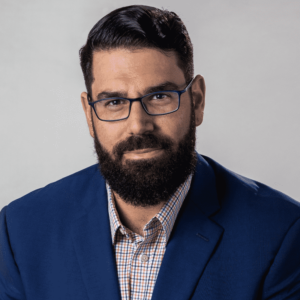By Donald H. Harrison


SAN DIEGO – The Middle East is divided between moderates who want peace with Israel and radicals who want to promote conflict, says Dan Feferman, an American-Israeli, who serves as executive director of Sharaka.
Sharaka is a non-governmental organization that wants to build upon the Abraham Accords. “Sharaka” is an Arabic word meaning “partnership.”
Feferman and four Arab colleagues will discuss the current situation in the Middle East at 7 p.m., Tuesday, Jan. 16 at Congregation Beth Am. His colleagues are Ahmed Khuzaie and Fatema Al Harbi of Bahrain; Youssef Elazhari of Morocco; and Maryam Younnes, a Christian born in Lebanon who was given Israeli asylum with her parents after Israel withdrew its forces from Lebanon in 2000.
Their visit is part of a West Coast tour that also will include presentations to students at SDSU and UC San Diego, and meetings with government officials, Feferman said. The delegation will also speak in Orange County, Los Angeles, and Seattle.
In a telephone interview from Israel on Thursday, Jan. 11, Feferman said that there is a “new Middle East” taking shape in which moderate Arab states seek official relations and technological cooperation with Israel. These countries are breaking from their past in which Israel was used by them as a scapegoat or a unifying force, Feferman said.
The Israel-Hamas War has complicated Sharaka’s task of strengthening relations between the Abraham Accords countries – including the United Arab Emirates, Bahrain, Morocco and Sudan – and promoting the extension of the accords to other Middle Eastern countries such as Saudi Arabia.
“After an initial bit of sympathy for Israel after the October 7th attack, you had two things happen simultaneously,” Feferman said. “One was that Israel had to retaliate—there was no other choice—in such a manner as to prevent Hamas from ever doing that again. Hamas had spent nearly the last 20 years developing Gaza into such a complex fortress that it assured there would be many civilian casualties were Israel ever to react. And then you had an unbelievably aggressive, planned, coordinated, and sophisticated propaganda campaign by Iran, Hamas and Hezbollah to push out so much misinformation and fake news about Israel, and, of course, to amplify the actual death toll that is happening in Gaza.”
“Any civilian deaths are tragic, of course, even if the numbers are exaggerated by Hamas, but they are certainly the fault and responsibility of Hamas, which uses a human shield strategy to deter Israeli counter-attacks and ensure a high civilian death toll.” At the same time, Hamas propaganda focuses on gruesome pictures of death and destruction meant to stoke emotions around the region. At times, Hamas and its allies, including in the US, gaslight the October 7 attack, as if Israel randomly invaded Gaza on October 8, while at other times, they present historical revisionism as if the massacre, rape and kidnapping of 1400 Israelis is somehow a legitimate response to the Palestinian claims of occupation.
This , heighted by the fact that Middle Eastern media largely does not portray the Israeli narrative, creates an atmosphere that people feel intimated by societal pressure or online trolls to back away from positive engagement with Israel at the moment. Many are still interested in engaging, but feel this is not the time.
Feferman said that the United States has become dangerously polarized on the issue, influenced by years of propaganda and a lack of deep understanding of Middle East affairs. This could lead to a weakening of the US’ ability to continue playing a positive role in the region and its important relationship with Israel and other regional moderates, like the Gulf states.
He said he hopes that Sharaka’s presentations here – with Muslim, Jewish, and Christian panelists – can lead to a better understanding of what is happening in the Middle East, and a new paradigm for watching developments in that region. “”We are seeking to show, through our example, that dialogue and honest exchange of information based on relationship building is critical and possible, especially during these difficult times,” he said. “One does not need to be anti-Israel to be pro-Palestinian, however we must all be aware of what certain groups, like Hamas, actually seek, and what certain slogans chanted in rallies or protests actually mean.”
Feferman is the son of an Israeli mother and an American father who made Aliyah to Israel in the 1970’s. Raised in Indiana, and after graduating from the American University in Washington DC, with a focus on International Relations and Middle East Studies, he moved to Israel and served in the IDF as an advisor and analyst on foreign policy matters, retiring as a major.
Later, he wrote and lectured on foreign policy, until three years ago when Sharaka was formed to promote better relations between Israel and Muslim communities, especially in the Arab world. He said that Sharaka is a non-profit, non-governmental and non-political initiative. It does not receive government funding, but its efforts to promote the Abraham Accords are supported and applauded by the Israeli and US governments, as well as others around the Middle East.
*
Donald H. Harrison is publisher and editor of San Diego Jewish World. He may be contacted via donald.harrison@sdjewishworld.com